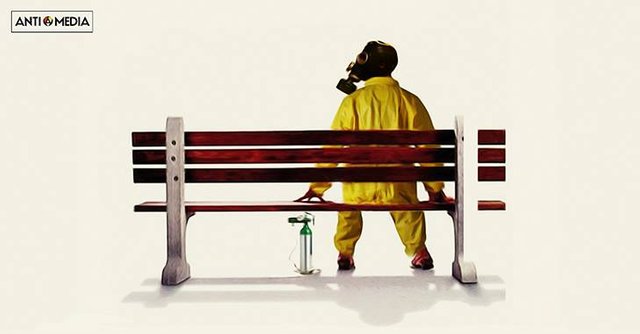EPA Contradicts Its Own Research, Claims Roundup Poses No Risk to Humans

On Monday, the U.S. Environmental Protection Agency issued a new report declaring that the weed killer glyphosate does not pose any meaningful risk to humans, but the report is not likely to end the debate over the safety of the world’s most widely used pesticide. The new report from the EPA is the latest in a string of conflicting reports from various health agencies around the world. Reuters first reported on the assessment:
“The EPA, in a draft risk assessment report issued on Monday, also said it found ‘no other meaningful risks to human health’ when glyphosate, the world’s biggest-selling weed killer, is used according to its label instructions.”
The EPA’s decision conflicts with a March 2015 report from the International Agency for Research on Cancer that found that glyphosate “probably” contributes to non-Hodgkin lymphoma in humans and classified it as a ‘Group 2A’ carcinogen. “There was sufficient evidence in animals, limited evidence in humans and strong supporting evidence showing DNA mutations and damaged chromosomes,” Aaron Blair, a scientist emeritus at the National Cancer Institute and lead author of the study, told Reuters at the time.
The IARC report was published in The Lancet Oncology and detailed evaluations of organophosphate pesticides and herbicides. The report concluded that there was “limited evidence of carcinogenicity in humans for non-Hodgkin lymphoma.” The evidence for this conclusion was pulled from studies of exposure to the chemical in the US, Canada, and Sweden published since 2001. The researchers found “convincing evidence that glyphosate can also cause cancer in laboratory animals.”
Shortly after the IARC review, the European Food Safety Authority (EFSA), an independent agency funded by the European Union, shot back with their own study, claiming glyphosate is “unlikely to pose a carcinogenic hazard to humans.” Earlier this month, the European Commission renewed the license to use glyphosate for another five years. The Commission’s renewal came despite the efforts of the European Citizens’ Initiative, called “Ban glyphosate and protect people and the environment from toxic pesticides.” The effort collected more than 1 million signatures.
Those studies were followed by research from experts with the United Nations’ Food and Agriculture Organization (FAO). The FAO released a statement claiming glyphosate is “unlikely to pose a carcinogenic risk to humans” exposed to it through food. The WHO co-signed the statement with the FAO. The organizations also found that glyphosate is not likely to be genotoxic — destructive to cell’s genetic material — in humans.
This means that as of December 2017, the United Nations’ Food and Agriculture Organization, the World Health Organization, the European Food Safety Authority, and the United Nations say glyphosate does not pose a risk of cancer to humans. On the other end of the spectrum, the WHO’s International Agency for Research on Cancer IARC states that it could be linked to cancer. To add even more confusion to the matter, in October, *Reuters reported that an analysis of the IARC’s assessment of glyphosate showed the agency ignored findings and deleted statements that contradicted their final conclusion. Reuters reported:
“The edits identified by Reuters occurred in the chapter of IARC’s review focusing on animal studies. This chapter was important in IARC’s assessment of glyphosate, since it was in animal studies that IARC decided there was ‘sufficient’ evidence of carcinogenicity. One effect of the changes to the draft, reviewed by Reuters in a comparison with the published report, was the removal of multiple scientists’ conclusions that their studies had found no link between glyphosate and cancer in laboratory animals.”
All this confusion among agencies does not help the average consumer when it comes to safety and health. Who should we trust when our very lives are on the line? Government agencies that operate a revolving door with big pharma, big ag, and other industrial complexes?
Despite the EPA’s latest decision, Jennifer Sass, a senior scientist for the Natural Resources Defense Council advocacy group, told Reuters that “[t]here is data suggesting cancer.” What data is Sass referring to?
She is more than likely talking about an EPA study from the 1980s that found glyphosate does, indeed, increase the likelihood of developing cancer. The 2015 IARC report points out that the EPA had originally classified glyphosate as possibly carcinogenic to humans in 1985. The IARC Working Group evaluated the original EPA findings and more recent reports before concluding “there is sufficient evidence of carcinogenicity in experimental animals.”
On November 1st, In These Times Magazine released an in-depth report titled “How Monsanto Captured the EPA (And Twisted Science) To Keep Glyphosate on the Market.” The investigation does a great job of outlining the history of regulation of glyphosate and how Monsanto — glyphosate is the key ingredient in Monsanto’s Roundup — has been able to influence and subvert regulatory agencies in order to make glyphosate the most widely used pesticide in the world. “Our two-year investigation found incontrovertible evidence that Monsanto has exerted deep influence over EPA decisions since glyphosate first came on the market—via Roundup—more than 40 years ago,” the report states.
The detailed investigation reveals that nearly every time a Monsanto chemical was receiving negative attention from scientists and researchers, the biotech company would hire its own researchers and firms or pressure government employees until they came to Monsanto’s preferred conclusion. The testing and approval of glyphosate seem to fit the pattern.
“Throughout the 1970s, EPA staff repeatedly raised red flags about the inadequacy of testing data that Monsanto was submitting in support of glyphosate’s original registration,” the report states. In These Times also examined EPA memos they say “detail incomplete or otherwise unacceptable toxicology screening tests.” The pressure to approve glyphosate can be traced back to 1983 when the EPA was examining toxicity data supplied by Monsanto. As part of the registration and approval process, Monsanto submitted a two-year mouse feeding study. In These Times writes:
“The mouse study was conducted for Monsanto by a commercial lab called Bio/Dynamics, but the results of the research were neither peer-reviewed nor made publicly available.
Staff toxicologists, pathologists and statisticians in the TB provided the first interpretation of these results. On March 4, 1985, an ad hoc committee of these scientists reported that based on this mouse study, glyphosate was carcinogenic, or a ‘Class C’ substance. They did not question the 1983 study’s structure or reported data. EPA staff toxicologist William Dykstra, in an April 3, 1985, memo, stated unequivocally, ‘Glyphosate was oncogenic in male mice causing renal tubule adenomas, a rare tumor, in a dose-related manner.’”
In true Monsanto fashion, the company hired four pathologists to review the original tissue slides from the 1983 study. Monsanto’s pathologists claimed to have seen a tumor in one of the mice in the control group. This finding cast doubt on the EPA’s original conclusion and the entire study. By March 1986, the EPA had reversed their designation of glyphosate as carcinogenic. Monsanto still relies on the claim that one of the control group mice also had a tumor so the cause could not have been glyphosate.
However, in another memo dated February 1985, Herbert Lacayo, a statistician with the EPA’s Toxicology Branch, stated that without glyphosate exposure, the odds of tumors appearing were about 156 to 1. “Under such circumstances a prudent person would reject the Monsanto assumption that glyphosate dosing has no effect on kidney tumor production,” wrote Lacayo. “Our viewpoint is one of protecting the public health when we see suspicious data. It is not our job to protect registrants from false positives.”
Officially, the chemical glyphosate and products like Roundup do not cause cancer and are of no harm to the planet or animals. However, when one takes a deeper look at the history of the studies and the company behind the product, valid reasons to be skeptical can be found.
I am an investigative journalist and liberty activist; a Lead Investigative Reporter for ActivistPost.com and the founder of the TheConsciousResistance.com & The Houston Free Thinkers. I have also co-authored three books with @johnvibes: The Conscious Resistance: Reflections on Anarchy and Spirituality and Finding Freedom in an Age of Confusion, Vol. 1 and Finding Freedom in an Age of Confusion, Vol. 2
Donate via Bitcoin: 16fDdrZvt9XUv7TyboSYtaHfcxMb22Yiew
I am always available for interviews, Please contact [email protected]
I greatly appreciate any support here or on my other social media:

Very intresting
good post. my big brthar @dbroze
Hello,
Thank you for the thorough article. At first I thought it was just borrowing from a big published article, but realized that it was mostly your work. Thanks.
Though I will normally not get very political.... And just want to support healthy advocates in home life, gardening and food production, and homesteading....
In this case I wanted to give my thumbs up!!
People need to know!!
Peace!
Monsanto didn't invent these techniques of politicizing science for profit. They seem to have optimized them for profitability, however.
There are plentiful examples of other companies, and even the EPA itself, scandalously concealing actual science, in order to potentiate highly profitable chemical products being marketed in the USA, and elsewhere.
While time has permitted investigators to eventually reveal such horrors from the 70's, I have no doubt that 50 years from now we'll know about the exact same things happening today.
Chemical pollution has devastated not only the environment and natural living systems, but humanity itself. People are amongst the most polluted, and pollution impacted species.
Endocrine disrupting chemicals and pollutants have caused a 60% drop in sperm counts in American men since the 1970's. The rate of emasculation continues to accelerate, and now is accompanied by radical politicization, and propaganda; promulgation of transgenderism in children via schools and publicly funded institutions, and various institutional mechanisms that seem intent on not only criminalizing, but demonizing men, and masculinity itself.
It's disgusting and perverse, and I am convinced presently that endocrine disrupting chemical castration is not accidental, but deliberate and malicious.
Destroying men virtually eliminates resistance to corruption and tyranny.
Thanks!
Always looking for more information on this topic... waiting for it to be banned one day. Is it true that glyphosate is responsible for gluten allergies in many people? Also, Derrick, when you say you're always open for interviews, what type of interviews are you talking about on your site? Conscious resistance is a great page to visit for current information, great job man!
That is certainly a connection that many have drawn. Whether it is absolutely true, I can't say, but I would not be surprised.
Video interviews, written, audio-only podcasts, it all works :-)
Thanks for your support and kind words!
How can anyone trust this research is beyond me EPA have been in bed with Monsanto for years. The independent research says it all. I often move Monsanto products when in a garden center hiding them behind other products or throwing them behind shelves :)